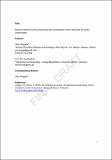| dc.contributor.author | Goggins, Gary | |
| dc.contributor.author | Rau, Henrike | |
| dc.date.accessioned | 2018-05-03T09:10:45Z | |
| dc.date.available | 2018-05-03T09:10:45Z | |
| dc.date.issued | 2015-06-19 | |
| dc.identifier.citation | Goggins, G., & Rau, H. (2016). Beyond calorie counting: assessing the sustainability of food provided for public consumption. Journal of Cleaner Production, 112, 257-266. doi: https://doi.org/10.1016/j.jclepro.2015.06.035 | en_IE |
| dc.identifier.issn | 1879-1786 | |
| dc.identifier.uri | http://hdl.handle.net/10379/7326 | |
| dc.description.abstract | Food consumption outside home is a growing phenomenon that is rapidly gaining in importance in terms of its impact on both consumers and the food system. This paper presents an innovative tool for measuring the sustainability of food intended for public consumption in organizations such as schools, hospitals and workplaces. Drawing on an in-depth review of the food sustainability literature, the FOODSCALE method quantifies 11 sustainability categories which together cover 36 food sustainability indicators. A number of characteristics distinguish the FOODSCALE method from other food sustainability assessment tools. First, it covers the three dimensions of sustainability society, economy, environment treating these as interdependent and coexisting. Secondly, it considers the entire food system, thus incorporating aspects of production, distribution, procurement, consumption and waste disposal. Cross-cutting themes of health and human agency complement the 11 specified categories to present a holistic assessment of food sustainability. The tool helps to identify both good practice and areas for improvement and points towards specific measures for increasing food sustainability. Following a detailed discussion of the tool, the paper presents results of a comparative study of 8 cases across 5 organizations in the Republic of Ireland.(2) Results show significant differences in sustainability performance across cases and within organizations. The role of key decision makers in organizations and possible points of intervention are highlighted in the discussion. The research demonstrates the potential of the FOODSCALE method for assessing the (un)sustainability of food intended for public consumption. Building on theoretical insights from the alternative food systems literature, the paper emphasizes the central role of organizations in supporting (un)sustainable food systems and highlights potential pathways toward more sustainable food procurement and provision. The paper makes a major contribution to the advancement of empirical research on the social, economic and environmental impacts of food provision in large-scale organizations. (C) 2015 Elsevier Ltd. All rights reserved. | en_IE |
| dc.description.sponsorship | We gratefully acknowledge the cooperation of individuals and organizations who participated in the testing of the assessment tool. We also wish to thank Dr Frances Fahy at NUI Galway as well as two anonymous reviewers for their constructive and helpful comments on an earlier draft. This paper was developed within the PhD research project ‘Public food consumption and the role of organizations in supporting sustainable food systems’ funded by the College of Arts, Social Sciences and Celtic Studies, NUI Galway, and the Irish Research Council Postgraduate Scholarship Scheme, whose support is also gratefully acknowledged. | en_IE |
| dc.format | application/pdf | en_IE |
| dc.language.iso | en | en_IE |
| dc.publisher | Elsevier | en_IE |
| dc.relation.ispartof | Journal Of Cleaner Production | en |
| dc.rights | Attribution-NonCommercial-NoDerivs 3.0 Ireland | |
| dc.rights.uri | https://creativecommons.org/licenses/by-nc-nd/3.0/ie/ | |
| dc.subject | Public food consumption | en_IE |
| dc.subject | Organizations | en_IE |
| dc.subject | Sustainability assessment | en_IE |
| dc.subject | FOODSCALE method | en_IE |
| dc.subject | SUPPLY CHAINS | en_IE |
| dc.subject | LOCAL FOOD | en_IE |
| dc.subject | NETWORKS | en_IE |
| dc.subject | SYSTEMS | en_IE |
| dc.subject | WASTE | en_IE |
| dc.subject | PLATE | en_IE |
| dc.subject | UK | en_IE |
| dc.title | Beyond calorie counting: assessing the sustainability of food provided for public consumption | en_IE |
| dc.type | Article | en_IE |
| dc.date.updated | 2018-05-02T12:48:44Z | |
| dc.identifier.doi | 10.1016/j.jclepro.2015.06.035 | |
| dc.local.publishedsource | https://doi.org/10.1016/j.jclepro.2015.06.035 | en_IE |
| dc.description.peer-reviewed | peer-reviewed | |
| dc.contributor.funder | Irish Research Council | en_IE |
| dc.contributor.funder | College of Arts, Social Sciences and Celtic Studies, NUI Galway | en_IE |
| dc.internal.rssid | 10563021 | |
| dc.local.contact | Gary Goggins, Energise Project Manager , School Of Geography And Archaeology , National University Of Ireland Galway. +353 87 123 2729 Email: gary.goggins@nuigalway.ie | |
| dc.local.copyrightchecked | Yes | |
| dc.local.version | ACCEPTED | |
| nui.item.downloads | 956 | |


